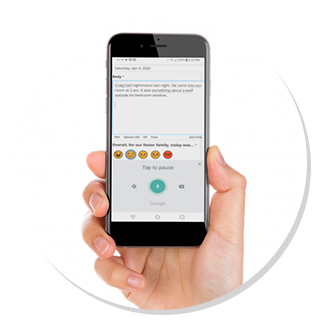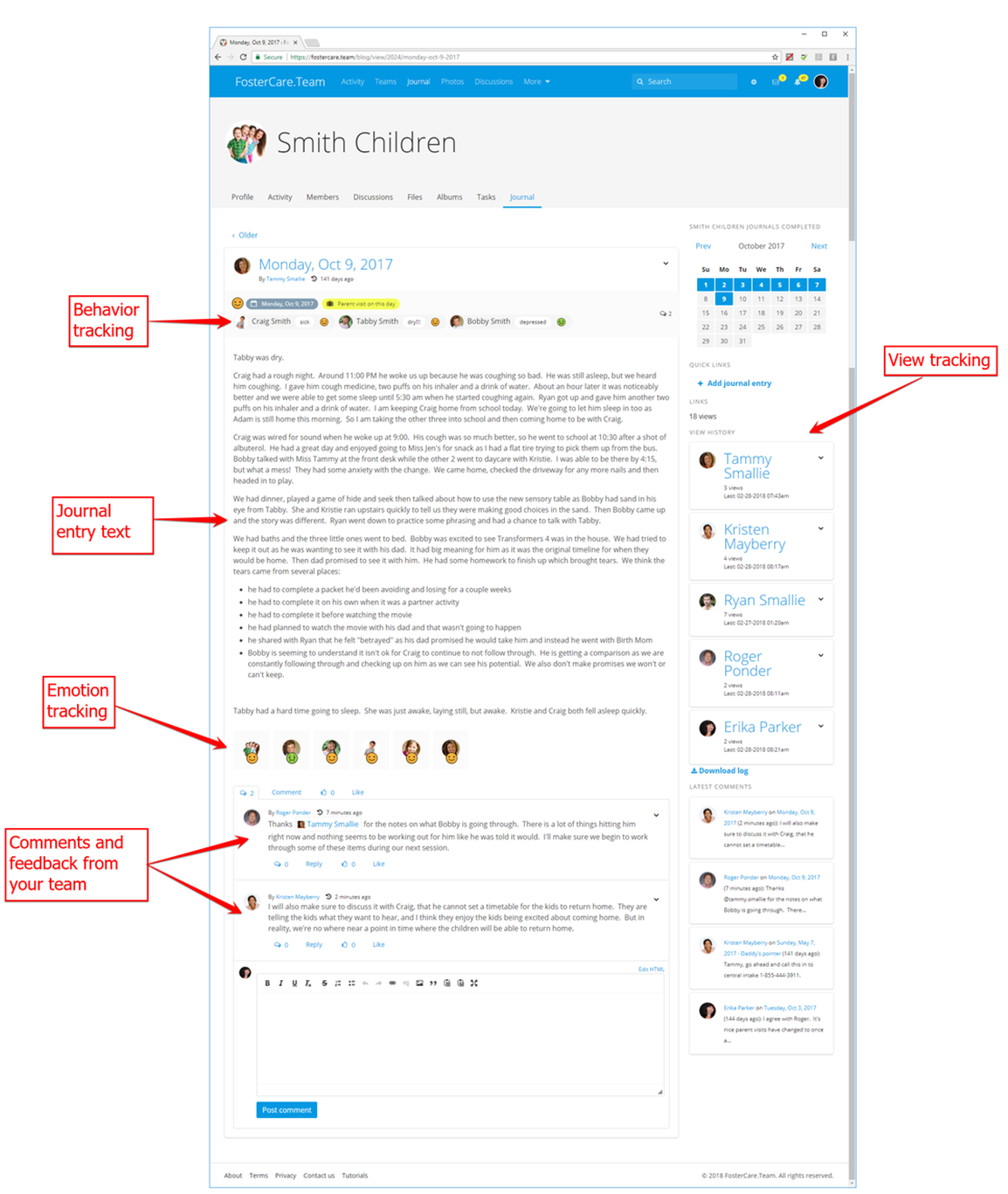Log in
Journal Entries
Journals inform and enlighten your team, while allowing you to process your thoughts and emotions.
A Customer Testimonial
Journaling has been proven to be a safe, cathartic release for the stresses of daily life. Journaling allows you to work through and process your thoughts and emotions. It's one of the primary tools psychologists offer to their clients who are experiencing grief, loss, stress or anxiety.
The Journal Entry module is at the heart of our system. It's where we track emotions and behaviors in order to give them more context. It allows the foster parents to provide others on the team a glimpse into the daily hum of their foster home.
Your journal becomes your voice. It's your advocacy platform. It's a documentation center for what happened, what was said, and for your views and opinions. Federal Law gives you the right to provide evidence and documentation to the judge. Your journals become the source of that documentation.
Journaling also allows foster parents to look back over time and see if behaviors are changing, getting worse or better. In our personal experience, it was amazing to look a back at year old journal entries and see how far our foster children had come. We also found there were some things we documented, that at the time, didn't seem to be very important, but as more details emerged and were documented, we were able to piece together a narrative which helped us better understand what our foster children had experienced. This, in turn, helps us better care for their needs.
Journal the child's behaviors to get to know him better. It is easy to magnify a situation so that it appears worse that it is. It is also possible to overlook incidents that might indicate a pattern. Journaling can assuage fears, refresh the memory, and increase clarity, which all helps the parent in dealing with the child.
Use your mobile device to easily dictate a journal entry and enter emotions and behaviors.

We recommend that foster parents write a journal entry every day for the first 30 days a child comes into care. Often there is a honeymoon period and when that ends, the behaviors begin. You don't know what behaviors you'll see with a new foster child and what their needs are. Having thorough documentation for the first 30 days helps develop patterns and identifies possible future service needs. After the first 30 days, discuss the journal frequency with your team. We recommend continuing to update the journal at least once a week even if it's just to say "Everything is fine. No issues." You should also journal during times of stress and during transition times, such as when the school year is starting or ending, or spring break is starting or ending, or if unsupervised visits begin. You should also write to document significant events such as a presentation at school, an injury, a new achievement. Finally, document what your children are saying before and after parenting visits. This is not an attempt to catch the birth parents doing something wrong. Rather, it's documenting the experience from the child's point of view using their own words. This could reflect negatively on the birth parents, or it could reflect positively on them. Children usually exit parenting time with strong emotions and opinions. Recording them accurately will help your entire team care for your children more effectively.
Make sure you set a regular time to write. If you decide to write "when you have some free time" it will never happen. Foster parents don't have free time. The best time to write is often at the end of the day when the kids are in bed. It allows you process, decompress, and actually sleep better knowing the day's events and interactions have been logged when they were fresh in your mind and not days afterward.
As a foster parent, have you ever felt alone or abandoned? You were given the responsibility to care for children who have experienced trauma and loss, but it doesn't seem like your caseworker has any idea of what you are going through. If they don't know your struggles, how can they support you? That's why we track views throughout our system. Our view tracker shows you which members of your foster care team have seen your journal entries, discussion posts, photos, child behavior pages, etc. and when they saw them. Just knowing that other members of your foster care team are in the loop and know what you are going through is incredibly important. You are not in this alone. You've got a team of professionals right beside you helping you care for your foster children. And now, thanks to you and FosterCare.Team, they'll know exactly what you and your foster children are going through and how best to help.
Additionally, caseworkers are given a 'knowledge' score in their agency dashboard. It represents the percentage of their teams' content (specifically journal entries and discussion topics) they have viewed in the last 30 days. Supervisors have access to this information, as well as other metrics, for all of their caseworkers. This is one way our system measures foster parent support and makes that metric available to supervisors.

Journaling is highly therapeutic. It's one of the best tools counselors recommend to people who are dealing with stress, grief, loss, and trauma. It helps you organize your thoughts and process what you are going through. It also gives your team valuable insight into your home. It helps them identify ways they can help you and your foster child. While more therapeutic benefits of journaling are realized when you sit, think and type, if you need to get a quick update in using your phone can be a way to do it.
There is increasing evidence to support the notion that journaling has a positive impact on physical well-being. University of Texas at Austin psychologist and researcher James Pennebaker contends that regular journaling strengthens immune cells, called T-lymphocytes. Other research indicates that journaling decreases the symptoms of asthma and rheumatoid arthritis. Pennebaker believes that writing about stressful events helps you come to terms with them, acting as a stress management tool, thus reducing the impact of these stressors on your physical health.
Scientific evidence supports that journaling provides other unexpected benefits. The act of writing accesses your left brain, which is analytical and rational. While your left brain is occupied, your right brain is free to create, intuit and feel. In sum, writing removes mental blocks and allows you to use all of your brainpower to better understand yourself, others and the world around you.

Purcell, M. (2018). The Health Benefits of Journaling. Psych Central. Retrieved on May 3, 2018, from
https://psychcentral.com/lib/the-health-benefits-of-journaling/
Published on PsychCentral.com. All rights reserved.
Like what you see? Want to see more? Request a demo: